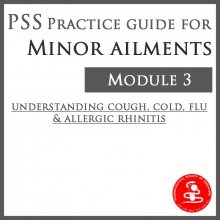
Statement of Intent
These practice guides not intended to serve as a standard of medical care. Standards of medical care are determined based on available individual-specific clinical data and are subject to change with advances in scientific data and models of care.
The contents of these guides serve as references for clinical practice, based on the best available evidence at the time of development. Adherence to these guides may not ensure a successful outcome in every case, nor should they be construed as including all proper methods of care or excluding other acceptable methods of care. Each pharmacist is ultimately responsible for the management of his/her unique patient in the light of the clinical data presented by the patient and the treatment options available. While recommended courses of intervention are provided, they do not serve as a substitute for clinical judgement by the pharmacist or the advice of a physician should the need for referral arises. The PSS assumes no liability for any direct, indirect, special or incidental events resulting from the use of these guides.
About The Practice Guides
The PSS Practice Guides for Minor Ailments (PSSPGMA) is a compendium of guidelines for 14 frequently encountered minor ailments. These practice guides are developed by the PSS Community Chapter after intensive and comprehensive review of literature and contextualising to the local setting. The key objective is to standardise practice across institutions, and enhance delivery of pharmaceutical care to patients and consumers in the primary sector. Each of the practice guides provides an overview of the topic, pointers on patient assessment, a systematic, evidence-based and stepwise approach to treatment, as well as relevant patient information leaflets to aid counselling. These practice guides will be available as e-learning modules on PSS website available to all members.
This project involves members from community pharmacies nationwide – Guardian, Watsons, Unity, National Healthcare Group Polyclinics, as well as Singhealth polyclinics. We hope these practice guides serve as vital clinical resources that equip community pharmacists with the pertinent updated knowledge to meet the ever evolving and increasing healthcare needs of the public.
PSS-PGMA Module 3: Understanding Cough, Cold, Flu and Allergic Rhinitis (Revised 2021)
There are 3 activities in this module.
IMPORTANT INSTRUCTIONS (Please read before you proceed):
| Activity 1 | Pre Test | You have 1 attempt for the Pre Test. Please note that a passing score is not required to continue with the activities of this module. Note: There is no save function for incomplete test attempt. However, it will not be considered an attempt if the test has not been submitted. |
| Activity 2 | Practice Guide for Cough, Cold, Flu and Allergic Rhinitis | Please complete this activity by viewing the Practice Guide. |
| Activity 3 | Post Test | You have 2 attempts for the Post Test. The explanation to the answers will only be displayed if the passing score is achieved. You will not be able to generate the Certificate of Completion if you do not obtain a passing score upon your second attempt. You will have to re-purchase the module in order to try again. The passing score is 80%. Note: There is no save function for incomplete test attempt. However, it will not be considered an attempt if the test has not been submitted. |
Module Validity Date: up to 31 January 2024, 23:59
After the Module Validity Date, activities can still be viewed. Pre and Post Tests will no longer be available and CPE points cannot be obtained after this date.
No. of CPE points: 2.0 (Category 3A)
There will NOT be auto-submission of CPE points to Singapore Pharmacy Council. Please file your CPE points via the Singapore Pharmacy Council Portal.
Refund Policy: Online products cannot be refunded.
Copyright © 2022 by Pharmaceutical Society of Singapore
